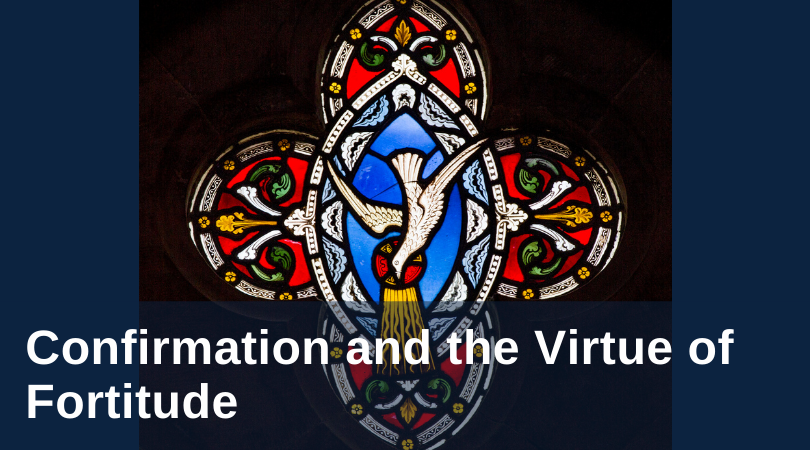
When I was 17, I had to get blood drawn. My mom went with me, and the phlebotomist happened to be an old acquaintance of hers. Making small talk, my mom asked the phlebotomist how her daughters were. She mentioned that one of her daughters was going through Confirmation, albeit reluctantly, and that she was encouraging her daughter to finish it “just in case, you know, she ever wanted to get married in the Church, it’s always a good thing to have in your back pocket.” I was so surprised at her attitude, as was my mother, who delivered some smart remark (ever so politely) about how she was pretty sure Confirmation meant a whole lot more than that. I’m not sure why this memory is so vivid, but I’ve never forgotten it.
Though this may come as a surprise to some, Confirmation is not about becoming an adult in the Church, or deciding for yourself whether or not you want to remain Catholic, or graduation (read: freedom) from Faith Formation/CCD classes. (If you were ever under the impression that it was, you’re not alone; at one point, I was too.) And it is certainly not just “a good thing to have in your back pocket.”
One of the three sacraments of initiation, Confirmation perfects and completes (or confirms) the sacramental grace which was begun at Baptism (the first sacrament of initiation). The unity between these two sacraments is made clear when candidates are asked to renew their baptismal promises. After the promises have been renewed, the bishop invokes the Holy Spirit and prays the following:
All-powerful God, Father of our Lord Jesus Christ,
by water and the Holy Spirit
you freed your sons and daughters from sin
and gave them new life.
Send your Holy Spirit upon them
to be their helper and guide.
Give them the spirit of wisdom and understanding,
the spirit of right judgment and courage,
the spirit of knowledge and reverence.
Fill them with the spirit of wonder and awe in your presence.
We ask this through Christ our Lord.
Then the bishop anoints the forehead of each person with sacred chrism oil, saying, “Be sealed with the gift of the Holy Spirit.” Like Baptism, Confirmation leaves an indelible mark on the soul. Those who receive it are forever marked for Christ.
Though all of the virtues and gifts of the Holy Spirit are made accessible through this sacrament, Confirmation can be especially understood through the virtue of fortitude. Rather than a completion of the sacraments, Confirmation marks a new chapter in the life of a Christian. It “[roots] us more deeply in the divine filiation, [incorporates] us more firmly into Christ, [strengthens] our bond with the Church, [associates] us more closely with her mission, and [helps] us bear witness to the Christian faith in words accompanied by deeds” (CCC, §1316).
To be a disciple of Christ means that our beliefs are evidenced by our words and actions. In Confirmation, “the confirmed person receives the power to profess faith in Christ publicly and as it were officially (quasi Ex officio)” (St. Thomas Aquinas, Summa Theologiae III,72,5, ad 2). The indelible mark that has been put upon our soul must be made visible. Yet, to follow Jesus is to be countercultural. Swimming against the tide is always difficult, particularly for young people. We long to be accepted, to fit in. Holding onto values and beliefs that are radically different from those of society—and thus constantly critiqued and challenged by society—is daunting. To do so, we need the gift of fortitude. We need courage.
Our all-knowing God recognizes this. He does not abandon us, but instead equips us with the grace and gifts needed to follow him, including the gift of fortitude. This gift “ensures firmness in difficulties and constancy in the pursuit of the good. It strengthens the resolve to resist temptations and to overcome obstacles in the moral life. The virtue of fortitude enables one to conquer fear, even fear of death, and to face trials and persecutions” (CCC, §1808). As with any gift, it must be opened and received. Fortitude, while a gift of the Holy Spirit, is also a virtue and must be cultivated and nurtured. The sacrament of Confirmation strengthens our fortitude, emboldening us in our conscious choices, our daily commitment, and our resolve to take up our Cross and follow Christ.
Like what you read? Submit your email below to have our newest blogs delivered directly to your inbox each week.
Featured image by Fr. Lawrence Lew, O.P.; CC-BY-NC-ND-2.0.


